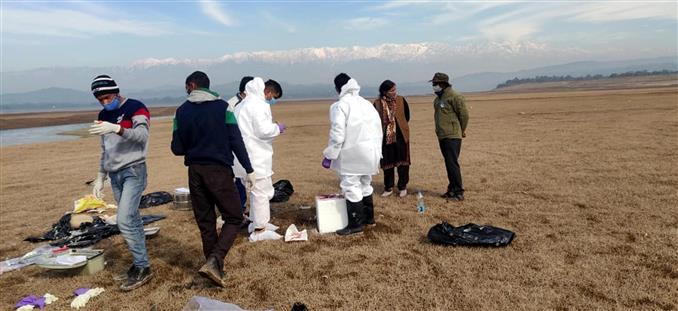Avian flu killing migratory birds in Pong dam
[ad_1]
Lalit Mohan
Tribune News Service
Dharamsala, January 4
Avian flu has killed over 1,700 aquatic migratory birds in Pong Dam wetland. As per the reports received by the district administration from Jalandhar and Palampur, avian flu has caused deaths of aquatic birds in Pong Dam lake in the last few days.
After the report was received the district administration today declared 1 km area from the Pong Dam lake as a red zone to contain the spread of virus in poultry birds and humans.
As per directives of district administration Kangra in red zone declared around Pong Dam, no human and domestic livestock activities shall be allowed in and around 1 km periphery of Pong Dam Reservoir till further orders.
Next 9 km of alert zone will be under surveillance zone where all departments shall keep vigil and watch. All tourist activities shall be suspended in Pong Dam reservoir till further order.
Anyone violating the order shall be prosecuted under Section 188, 269, and 270 of the IPC.
The deputy commissioner Kangra, Rakesh Prajapati when contacted admitted that it has been confirmed that the bird deaths have been caused by avian flu. However, the type of flu that has causes death would be confirmed after the reporters are received from Bhopal tomorrow.
The district authorities of Kangra have banned sale of poultry products in all Dehra, Jawali, Fatehpur and Indora subdivisions of Kangra district. All these sub divisions lie along he Pong Dam lake. In the last few days more 1,700 migratory birds have died along the lake.
The deputy commissioner said as precaution sale of poultry products as eggs and poultry meat has been banned in Dehra, Jawali, Fatehpur and Indora subdivisions.
‘If avian flu spreads in poultry we might have to cull the poultry birds also. Besides the migratory birds there have been reports that some local birds like crows have been found dead in Pong Dam wetland area,” he said.
As per centre for disease prevention government of India, Avian flu or influenza refers to the disease caused by infection with avian influenza viruses. These viruses occur naturally among wild aquatic birds worldwide and can infect domestic poultry and other bird and animal species. Avian flu viruses do not normally infect humans. However, sporadic human infections with avian flu viruses have occurred.
Avian influenza A viruses are very contagious among birds and some of these viruses can sicken and even kill certain domesticated bird species, including chickens, ducks, and turkeys. Infected bids can shed avian influenza A viruses in their saliva, nasal secretions, and faeces. Susceptible birds become infected when they have contact with the virus as it is shed by infected birds. They also can become infected through contact with surfaces that are contaminated with virus from infected birds.
The centre disease prevention site also states that although avian influenza A viruses usually do not infect people, rare cases of human infection with these viruses have been reported. Infected birds shed avian influenza virus in their saliva, mucous and faeces. Human infections with bird flu viruses can happen when enough virus gets into a person’s eyes, nose or mouth, or is inhaled. This can happen when virus is in the air (in droplets or possibly dust) and a person breathes it in, or when a person touches something that has virus on it then touches their mouth, eyes or nose. Rare human infections with some avian viruses have occurred most often after unprotected contact with infected birds or surfaces contaminated with avian influenza viruses. Illness in people has ranged from mild to severe.
[ad_2]
Source link




